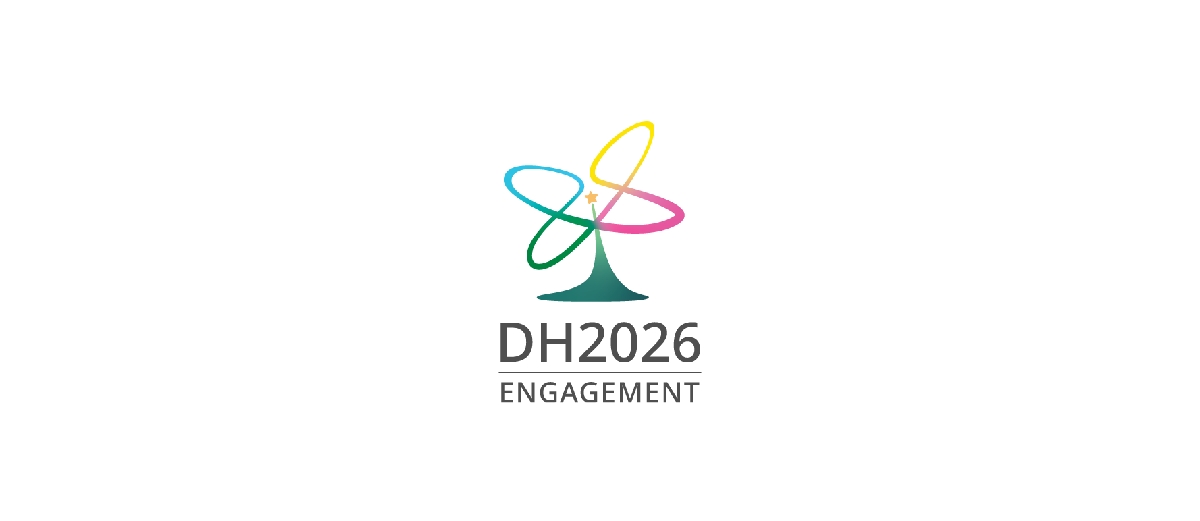
Official event website: https://dh2026.adho.org/
DH2026 is the 36th annual conference of the Alliance of Digital Humanities Organizations (ADHO). The conference will take place from July 27 to July 31, 2026, at the Daejeon Convention Center in Daejeon, South Korea. Hosted by the Korean Association for Digital Humanities (KADH), the conference will explore the theme of Engagement. We look forward to seeing you there!
DH2026 encourages the exploration of digital divides—not only across geographic regions, but also in terms of technological access, economic inequality, and uneven academic infrastructures. The conference seeks to foreground frameworks of methodological engagement that promote equity, foster cross-disciplinary dialogue, and support ethical uses of technology that amplify—rather than marginalize—diverse humanistic perspectives.
Set in South Korea, a country that exemplifies both enduring cultural heritage and cutting-edge digital innovation, the conference offers a timely opportunity to examine how emerging technologies and methodologies—particularly AI— shape knowledge production, cultural memory, and scholarly expression across the globe.
By raising questions such as “How can technological advancement deepen and diversify humanistic inquiry?” and “What does it mean to ethically engage with artificial intelligence and computational tools in a global digital humanities practice?,” DH2026 aims to critically address the epistemological and methodological challenges posed by emerging technologies at the intersection of computation and the humanities.
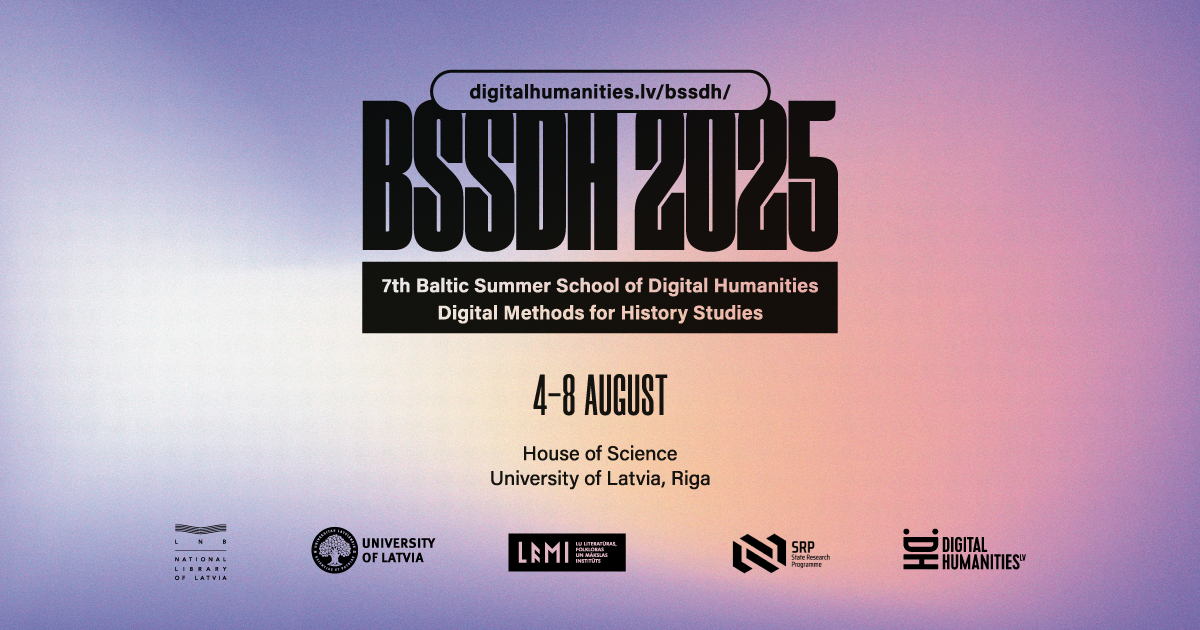
Official event website: https://www.digitalhumanities.lv/bssdh/2025
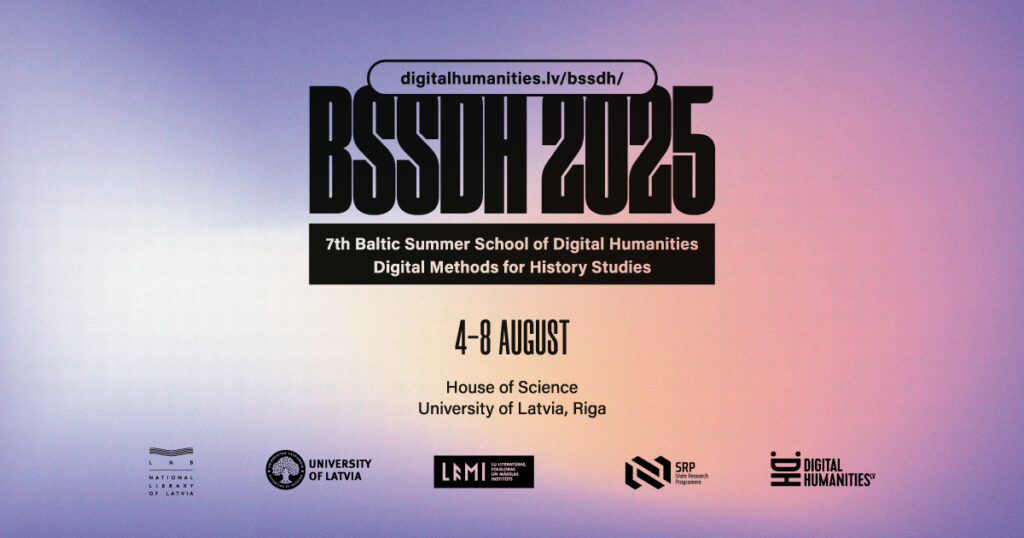
7th Baltic Summer School of Digital Humanities Digital Methods for History Studies
When: 4 August - 8 August 2025
Where: Riga, University of Latvia's House of Science
Language: English
Duration: 5 days
Fee: 50 EUR
Welcome to the annual Baltic Summer School of Digital Humanities (BSSDH 2025)!
The 7th Baltic Summer School for Digital Humanities will be held in Riga at the University of Latvia's House of Science from August 4–8. This year’s Summer School will focus on topics relevant to history researchers, students, and anyone interested in exploring history and humanities through digital methods. Lectures and workshops will cover subjects such as automated digitization of handwritten texts, network visualization, historical networks, spatial analysis and mapping (GIS), as well as a practical overview of the emerging AI technologies and their use in humanities research, by using chat prompting versions and also accessing LLM (large language models) with API. You can see the confirmed keynote lectures and workshops here, the full programme will be finalized during March.
PARTICIPANTS
There are no prerequisites for participation, as the workshops do not require any prior knowledge of Digital Humanities computing. The summer school is aimed at humanities researchers and students who have interest in digital methods, with beginner to intermediate skills in digital humanities. Learning computers and new technologies for humanists can be a demanding task. Building on the experience of previous years, BSSDH strives to create a community where participants can share their challenges, their findings and their know-how with each other. For that reason we plan daily wrap-up and sharing sessions – to process what was experienced during the day, what has been learned, and what needs to be addressed again.
REGISTRATION FEE
The fee for the Summer School is 50 EUR. Payment is due upon receipt of confirmation of acceptance. The registration fee covers access to all workshops, lectures, receptions, and refreshments as outlined in the programme. Participants are responsible for organizing their own accommodation, travel arrangements, and covering these expenses.
ECTS points or micro-credentials will be awarded upon completion of all requirements.
Please note that we do not provide visas for travel.
REGISTRATION FORM
The initial round of applications is open until March 20, or until class capacity is reached. Applicants will be notified by April 3 regarding their acceptance to the BSSDH2025.
Please fill the form:
https://forms.gle/NwLjaDRy36BrkPay5
ORGANIZERS
Sanita Reinsone2, Haralds Matulis1, 2, Anda Baklāne3, Elīna Gailīte1, Ieva Vīvere1, Jānis Daugavietis1, Jānis Tomaševskis2, Ilze Ļaksa-Timinska1, 2, Mārcis Kalniņš2, Eva Ausēja3.
BSSDH 2025 is organized by a joint effort of the, Institute of Literature, Folklore and Art (University of Latvia)1, Faculty of Humanities of the University of Latvia2 and National Library of Latvia3.
SUPPORTERSState Research programme
VPP-IZM-Vēsture-2023/1-0003
Faculty of Humanities of the University of Latvia
CONTACT US
Coordinator Elīna Gailīte
dh@lulfmi.lv
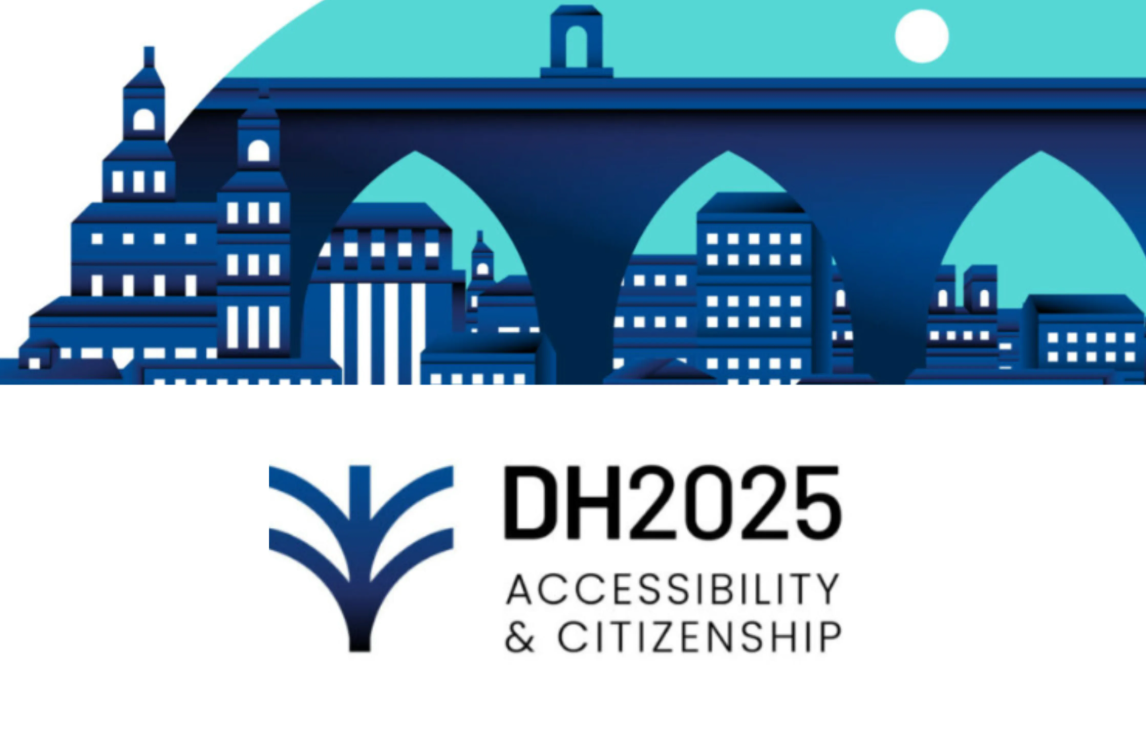
Official event website: https://dh2025.adho.org
DIGITAL HUMANITIES 2025 Building access and accessibility, open science to all citizens Lisbon, July 14-18, 2025.
Building access and accessibility, open science to all citizens
In 2002, the Budapest Open Access Declaration amplified the need to make research more widely available and free to anyone with internet access. Lately, Open Science or Open Scholarship have reframed concepts such as openness, access and accessibility from a technical and ethical perspective, taking into consideration data, infrastructure, and/or collaboration. National, international, or organizational manifestos, statements, declarations, principles, and policies related to scholarly objects, practices or methods are being formulated to improve and accelerate research through increased transparency, collaboration, and a more inclusive access to scientific knowledge of our societies.
By leveraging digital tools and methodologies, the digital humanities have been aiming at democratizing access to knowledge, fostering community engagement, and addressing contemporary societal needs and challenges in several meaningful ways.
We encourage submissions from all who work in all digital humanities disciplines, methodologies, and pedagogies, including students and early career scholars. We particularly invite proposals that relate to the theme, including but not limited to the following topics:
Conference Formats
1. Poster proposals present work on any relevant topic or offer projects, tools, artwork, creative visualization, and software demonstrations in early or later stages of development. Abstracts should be 500-750 words.
2. Short paper proposals are appropriate for reporting on experiments, work in progress, and newly conceived tools or software in early stages of development. Short paper presentations last 10 minutes. Short-paper sessions last 90 minutes and involve five short papers. Abstracts should be 750-1000 words.
3. Long papers are appropriate for substantial, completed, and previously unpublished research; reports on developing significant new methodologies or digital resources; and/or rigorous theoretical, speculative, or critical discussions. Long paper presentations last 20 minutes. Long-paper sessions last 90 minutes and involve three long papers. Abstracts should be 1250-1500 words.
4. Panel sessions focus on a single topic and consist of a) one 90-minute panel of four to six speakers or b) three long presentations. Panel proposers should consider issues of diversity in a regional context as they choose panelists. The abstract should be 300-500 words for overviewing the panel topic, as well as 250 words describing each paper.
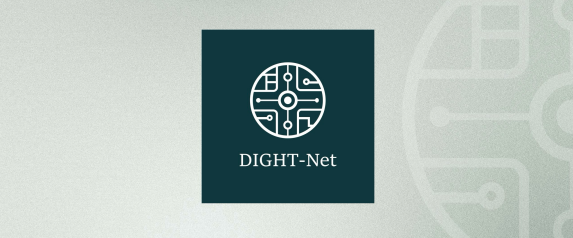
Official event website: https://dight-net.tlu.ee/dight-net-research-seminar-beyond-the-archive-mapping-the-future-of-digital-cultural-heritage/
On June 4-6, 2025, the DIGHT-Net Research Seminar “Beyond the Archive: Mapping the Future of Digital Cultural Heritage” will be held at Tallinn University. This three-day seminar is a forum designed to take stock of where the field of digital cultural heritage stands today, and where it might head next. Over the course of the seminar, we will move from broad conceptual mapping, through practical digitisation case studies, to the challenges of working with digitised personal archives. Each day brings together scholars and memory institution professionals who have broken new ground – whether by building new research infrastructures, experimenting with AI tools, or negotiating the ethics and sustainability of digital archives.
By interweaving concise “inspiration talks” and academic presentations with extended roundtables, the programme is intended to inspire dialogue rather than broadcast monologues. The aim of the forum is to identify common bottlenecks – technical, legal, or conceptual – and to sketch collaborative solutions that can travel across national and disciplinary borders. Estonia’s own fast-growing digital heritage ecosystem provides a living laboratory for many of the questions we shall debate. The event also serves as a launching pad for a prospective Digital Cultural Heritage Research Hub at Tallinn University – an initiative that seeks to consolidate scattered expertise and co-ordinate future grant applications.
We invite participants to treat these days not as a conference to attend, but as a workshop to co-create – bringing forward ideas, reservations, and next steps alike.
The full programme is available for viewing here: Programme DIGHT-Net Seminar Beyond the Archive.
To participate in the seminar, please register here: https://forms.gle/JPwtmoDor3iiCCLQ7. (The organisers reserve the right to select participants from among those registered in the event of limited capacity.)
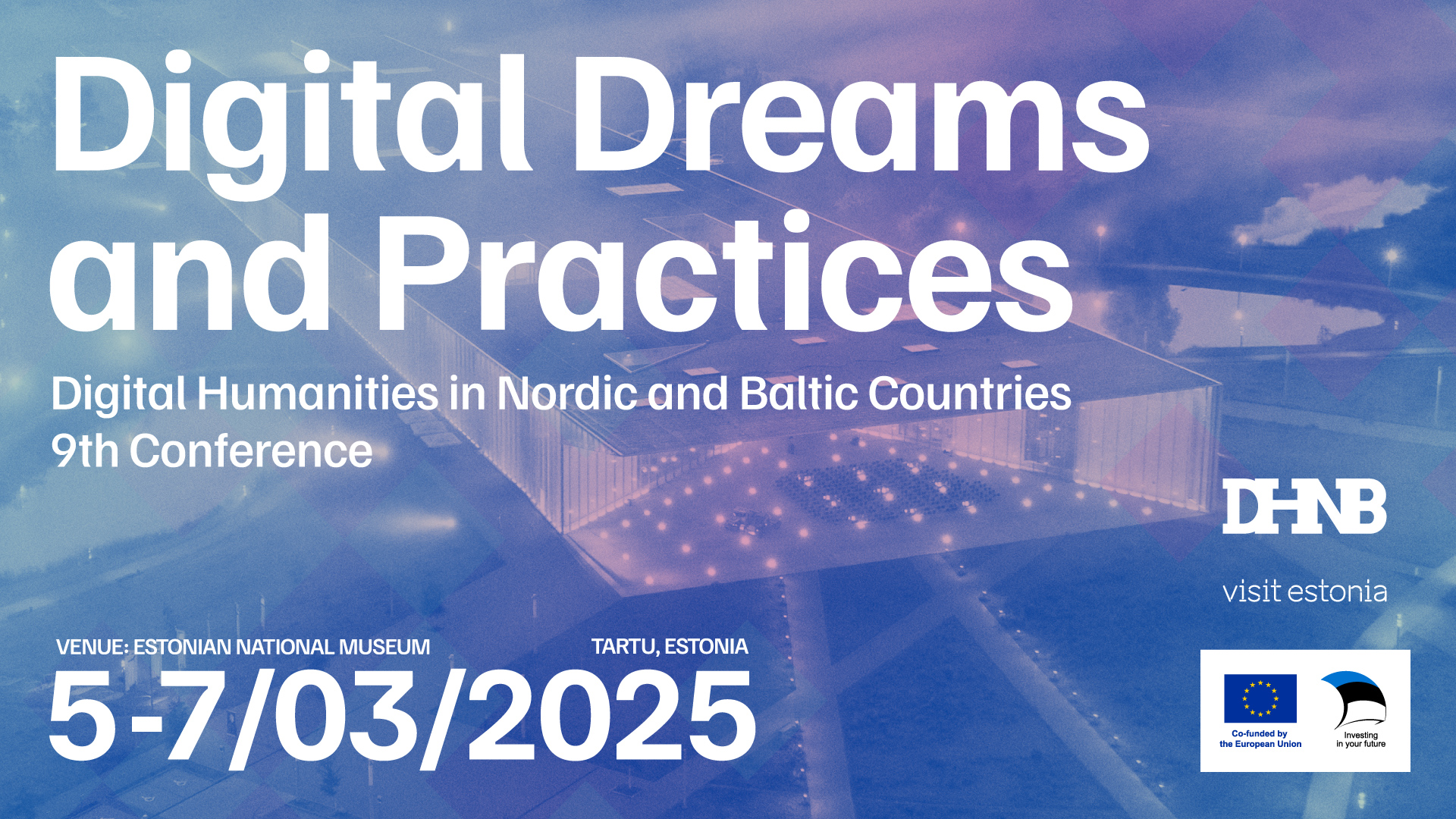
Official event website: https://dhnb.eu/conferences/dhnb2025/
DHNB conferences focus on research, education and communication in the interdisciplinary field of digital humanities in the Nordic and Baltic regions and beyond. The conference has a history of bringing together academics, researchers, students, and professionals with an interest in applying digital methods to research relevant to humanities, social sciences and arts. DHNB invites contributions from all domains of digital humanities.
Important dates:
With the special theme of DHNB2025 ‘Digital Dreams and Practices’ we aim to delve into the synergy between dreams in digital humanities and their practical applications, seeking to maximize value for both academia and society at large. Our focus sharpens on the transformative potential of AI, its integration with traditional humanities, and its role in transcending academic boundaries. We invite scholars, practitioners, and societal stakeholders to explore:
(1) the integration of traditional humanities scholarship with computational techniques;
(2) the transition of digital humanities research from the ‘ivory tower’ of academic theory to societal practice;
(3) the practical applications of Artificial Intelligence.
Integrating traditional humanities and computation
DHNB has long been committed to the importance of both domain expertise and methodological precision in research excellence. Digital humanities begin with explorations of data with a humanities lens, but the strongest impact is achieved when solid computational methods are applied to questions important to established fields with long research traditions. We especially invite contributions that are theory-driven, question-focussed, and advance open cases of interest in the humanities and related fields.
Coming down the ‘Ivory Tower’
Digital humanities research is highly relevant to the modern world, extending from practical uses of data in the humanities to offering perspectives on societal issues. This requires deliberate efforts to step outside academic discourse and actively engage with non-academic entities, including state institutions, NGOs, and private companies. We especially invite contributions that emphasize and develop the societal relevance of digital humanities and actively cultivate collaborations between academic researchers and non-academic organizations. We are particularly interested in proposals that showcase these partnerships, highlighting the tangible outcomes and lessons learned from such collaborations. By emphasizing the practical applications and societal impact, we aim to showcase research whose value extends beyond academic circles.
Artificial Intelligence and the humanities
In recent years, Artificial Intelligence has become a household topic with the increased power of large language models, user-friendly accessibility in apps like ChatGPT, and profound societal impact, raising concerns about data privacy, fair use of data, and the future of jobs. AI has increasingly shown the capacity to assist in or even automate tasks that have previously relied on human creativity. This encompasses a wide spectrum, from the generation of visual art and the creation of research reports to conducting qualitative readings of text. We especially invite contributions that deal with aspects of AI in practice. We encourage papers that explore the interplay between digital humanities and emerging Artificial Intelligence, including introducing innovative use cases, discussing ethical frameworks, or examining societal implications.
Topics of interest for the theme of DHNB2025 include, but are not limited to, the following:
Integrating traditional humanities and computation
Coming down the ‘Ivory Tower’
Artificial Intelligence
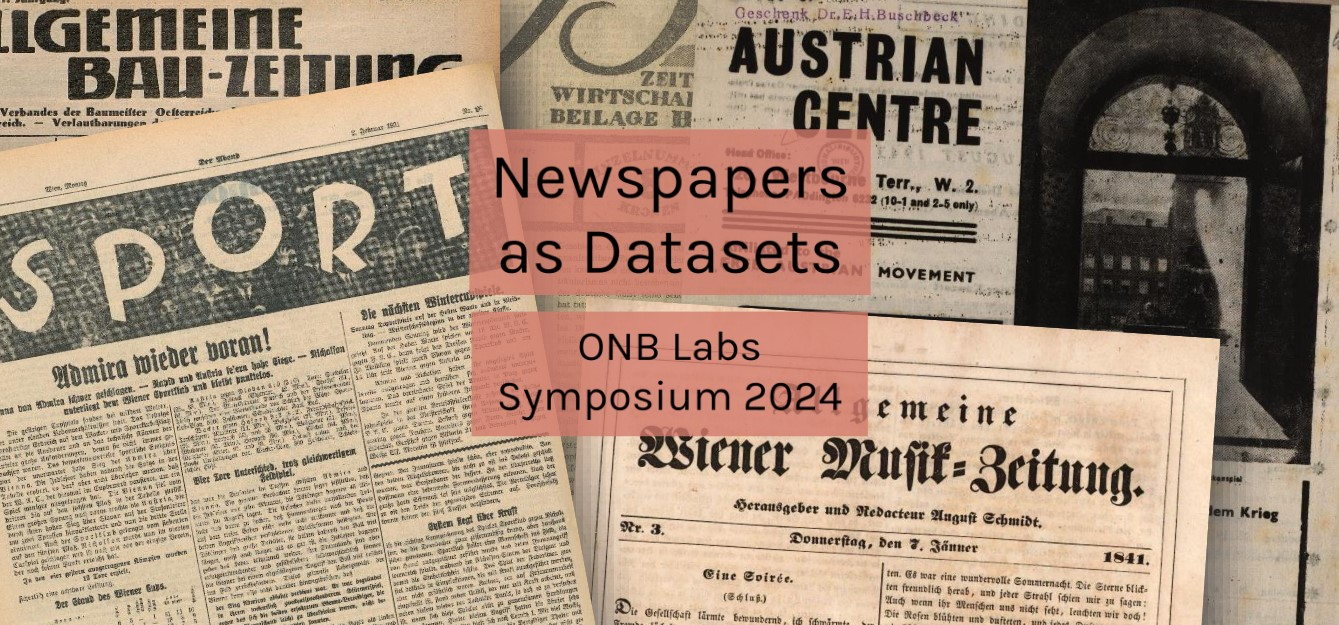
Official event website: ONB Labs - ONB Labs Symposium 2024
On November 25th and 26th, 2024, a new edition of the ONB Labs Symposium will take place in the Oratorium of the Austrian National Library! Under the theme “Newspapers as Datasets”, the event will offer four panels over the span of two half-days on the diverse topics of collections as data and especially newspapers as datasets, artificial intelligence and its applications in libraries. The panels will include presentations by researchers in international projects, current work reports by researchers and presentations by staff at national libraries and AI labs.
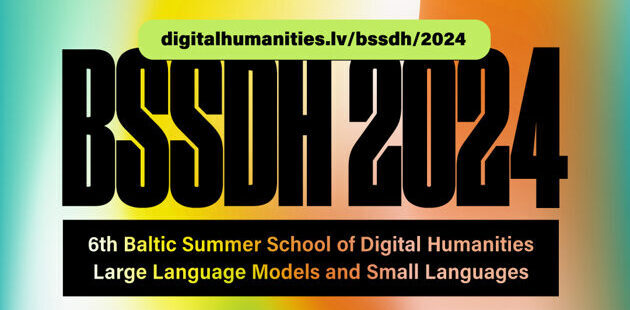
Official event website: https://www.digitalhumanities.lv/bssdh/2024/
When: 22 July - 26 July 2024
Where: Riga, National Library of Latvia and Online
Language: English
Duration: 5 days
Credits: 3 ECTS
Fee: 40 EUR*
----
Welcome to the annual Baltic Summer School of Digital Humanities (BSSDH 2024)!
This year's program presents essential introductory courses tailored for digital humanists and digital social scientists eager to master Python programming and explore the application of large language models in humanities research. Recognizing the pivotal role of lemmatization and dependency parsing in text analysis, particularly for small language datasets, we've dedicated a workshop to these techniques. The course is delivered by an international team of experienced researchers and practitioners from Latvia, Norway, and Estonia, representing the fields of digital humanities and digital social sciences. As always, this presents an invaluable opportunity to connect with peers and mentors from various countries, offering a rich exchange of ideas and perspectives.
The programem includes workshops and lectures in:
PARTICIPANTS
The Baltic Summer School of Digital Humanities is aimed at students and researchers of humanities and social sciences, library, and archives professionals. There are no prerequisites for participation, as the course does not require any background in DH computing. The working language of the summer school is English. After successful completion of the summer course, students will be awarded 3 ECTS by the University of Latvia.
REGISTRATION FEE*
40 EUR includes: Full access to all lectures and workshops, onsite or online. Food and drinks during lunch and coffee breaks for onsite students. Access is free of charge for assistants of workshops and other volunteers. Contact dh@lnb.lv to apply!
REGISTRATION FORM
https://reg.lnb.lv
SUPPORTERS
State Research programme
Nr. VPP-IZM-DH-2020/1-0002
Common Language Resources and Technology Infrastructure
https://www.clarin.eu/
https://clarin.lv/lv/
EU Recovery and Resilience Facility project Language Technology Initiative
No. 2.3.1.1.i.0/1/22/I/CFLA/002
ORGANIZERS
BSSDH 2024 is organized by a joint effort of the National Library of Latvia, Institute of Literature, Folklore and Art (University of Latvia), Faculty of Social Sciences of the University of Latvia.
CONTACT US
Coordinator Anda Baklāne
anda.baklane@lnb.lv
dh@lnb.lv
+371 29 143 299
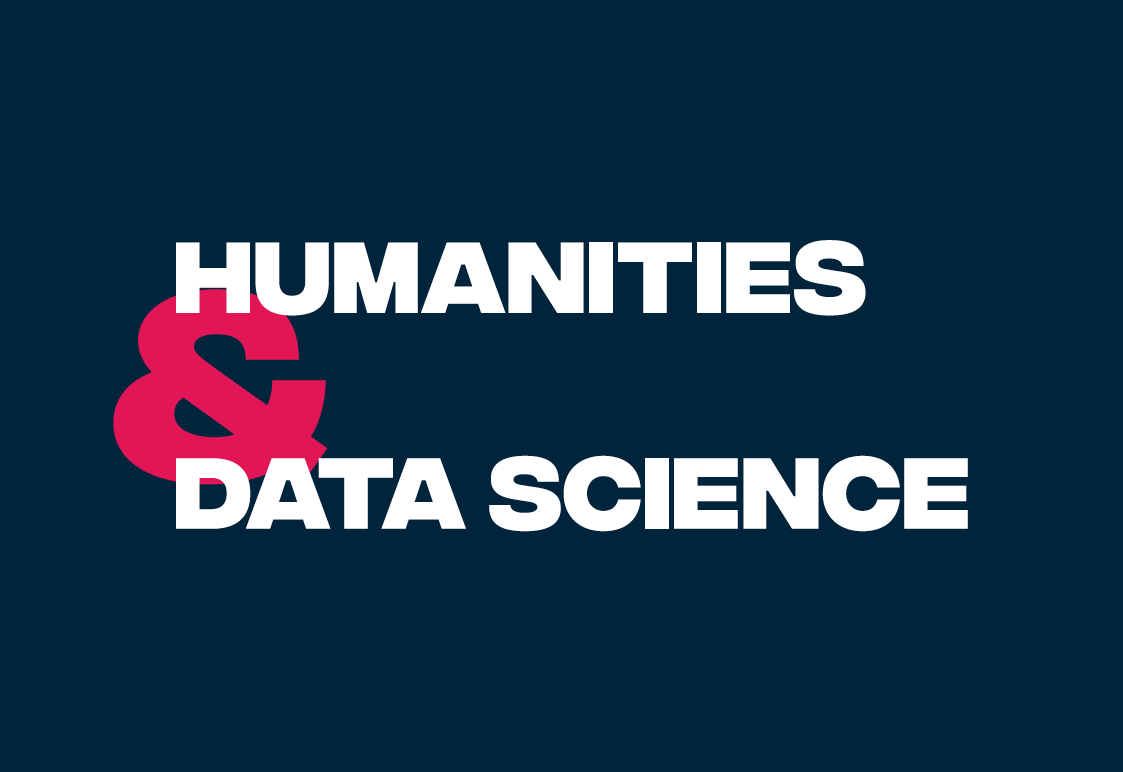
Online registration: https://app.onlinesurveys.jisc.ac.uk/s/oxford/disrupting-digital-humanities-generative-ai-in-research-and-e-1
In-person registration: https://app.onlinesurveys.jisc.ac.uk/s/oxford/disrupting-digital-humanities-generative-ai-in-research-and-edu
The Alan Turing Institute special interest group in Humanities Data Science is hosting an event in Oxford, 'The Impact of Generative AI on the Digital Humanities: Disruption in Research and Education' on 21st June 2024. The event will be held in the Weston Library lecture theatre, with lunch in Blackwell Hall. It will also be streamed online.
The Turing Humanities and Data Science Event on 21 June 2024 brings together experts to explore both the positive and negative disruptive potential of generative AI in research, education, and creative industries. The event, organised by the Turing special interest group “Humanities and Data Science”, features talks and discussions addressing key topics such as the transformative impact of AI on research and education (Ioannis Votsis), experiential learning and training AI models (Chris Birchall), media tokenization and attribution in cultural and creative industries (Frances Liddell), innovations in email archiving and sensitive information handling using generative AI (Peter Chan), and the intersection of generative AI with EU policy and governance in creative arts (Daria Onitiu). Attendees can expect a deep dive into applications of generative AI, its challenges and implications for academia and beyond, highlighting the need for responsible and creative integration of these technologies.

Official event website: https://dhnb.eu/conferences/dhnb2024/cfp/
The DHNB aims to support research, education, and the dissemination of digital humanities in the Nordic and Baltic countries. For over seven years, the DHNB conferences have brought together academics, researchers, students, librarians, archivists, curators and museum professionals interested in creating and using digitised and born-digital collections as research data in the humanities, social sciences and arts. The DHNB has matured both as an organisation and as a community, something which is evident in the extensive compilation of outputs (https://dhnb.eu/publications/). Our annual gatherings have consistently served as a forum to showcase digital research, methodologies, technology, pedagogy and practice at the intersection that exists between academic disciplines and cultural heritage institutions. With its present level of maturity, the DHNB is now offering an opportunity to reflect on the development of these approaches and share insights that have been gained along the way.
One unique aspect of the DHNB community is the active involvement of professionals from libraries, archives, and museums alongside digital humanities researchers. In the DHNB 2024 call for papers, we would particularly like to place emphasis on sharing lessons learned from collaborative initiatives between academic and cultural heritage communities, something that is exemplified by the work of our conference host, the Icelandic Centre for Digital Humanities and Arts.
Topics of interest for the theme of DHNB2024 include, but are not limited to, the following:
CROSS-INSTITUTIONAL AND INTERDISCIPLINARY COLLABORATIONS
EDUCATION AND ADVOCACY
THE LIFE CYCLE OF DIGITAL HUMANITIES AND ARTS PROJECTS
The DHNB encompasses a wide range of disciplines, including the humanities, arts, the social sciences, and related fields. Professionals working in various sectors, such as cultural heritage, information and communications technology, and research software engineering, are encouraged to contribute and share their perspectives on working in an institutional setting within the digital humanities framework. The Program Committee welcomes and encourages submissions from early career researchers, new cultural heritage professionals and individuals who will be attending or presenting for the first time.
| 1 November 2023 | CfP opens |
| 21 January 2024 | CfP (abstracts and full papers) closes |
| 21 January – 15 February 2024 | CfP review period |
| 15 February 2024 | Notifications issued |
| 24 February 2024 | Deadline for submitting revised full papers and abstracts |
| 25 February 2024 | Registration opens |
| 26 April 2024 | Deadline for registering for the conference for all authors |
| 1 May 2024 | Early bird deadline |
| 15 May 2024 | Deadline for uploading posters |
| 15 May 2024 | Registration closes |
| 27-29 May 2024 | Pre-conference workshops |
| 29-31 May 2024 | Conference |
As an interdisciplinary conference between traditions, the conference welcomes both abstract as well as full-text submissions in the following three categories:
Long papers | 20-minute presentations with a 10-minute Q&A
Must be submitted as either:
Short papers | 10-minute presentations with a 5-minute Q&A
Posters and demos with accompanying a 1-minute lightning talk
Between the proposal categories, the following conceptual divisions apply: for long papers, the work is expected to be substantial and robust, while short papers can also report on preliminary or tentative results, or on work that is still in progress. Poster papers can either be small self-contained works, or also general project descriptions. The programme committee also reserves the right to accept submissions in a category different from the one submitted in, so e.g. a long paper can be accepted to be presented as a short paper or as a poster in the poster session.
All full-text submissions must be formatted according to the DHNB PUB template, as they will be published in a citable conference proceedings collection (https://journals.uio.no/dhnbpub/index). The abstracts, on the other hand, will be gathered into a book of abstracts. After the conference, a separate call for post-proceedings will be issued, with its own deadlines for submissions, reviews and revisions. Additional information and instructions can be found on the DHNB website: https://dhnb.eu/publications/.
Apart from the individual paper submissions, the conference also accepts proposals for:
60 to 90-minute panels
Half-day or full-day conference-themed workshops
Workshops can take many forms, from community hacking sessions to thematically focused mini-conferences attached to the main one, whose presentations are either pre-selected, or sourced through separate calls for proposals solicited by the workshop coordinators.
Half-day or full-day tutorials
All proposals should be submitted in English via the ConfTool conference management system. In addition to following the submission-specific requirements outlined above, proposals should clearly state how they contribute to the advancement of topics related to the conference themes, how they relate to previous work (if applicable), and the potential impact they may have on the advancement of the field. All proposals should be accompanied by three to five keywords.
Within the appropriate fields (author details and affiliations), submissions should include: name(s), contact details and the organisational affiliation of the author(s) along with the name(s) of presenters. At least one author of each accepted paper must register for the conference and present the paper. Participants can only be the first author (= presenter) of one paper at the conference and the second author/contributor of one additional paper (long paper, panel, or show-and-tell presentation).
Anyone interested in submitting a proposal for the ad-hoc program, such as drop-in talks, lean coffee, or show-and-tell, can contact us at DHNB2024@hi.is.
Submitted proposals will undergo a single-blind peer-review process whereby the reviewers know the names/affiliations of the abstract authors and co-authors. Authors may be asked to make revisions before publication. The program committee will review all submissions and send out notifications of acceptance/rejection by 15 February.
Authors will be asked to review their submissions before the publication.
For questions, please send an email to DHNB2024@hi.is
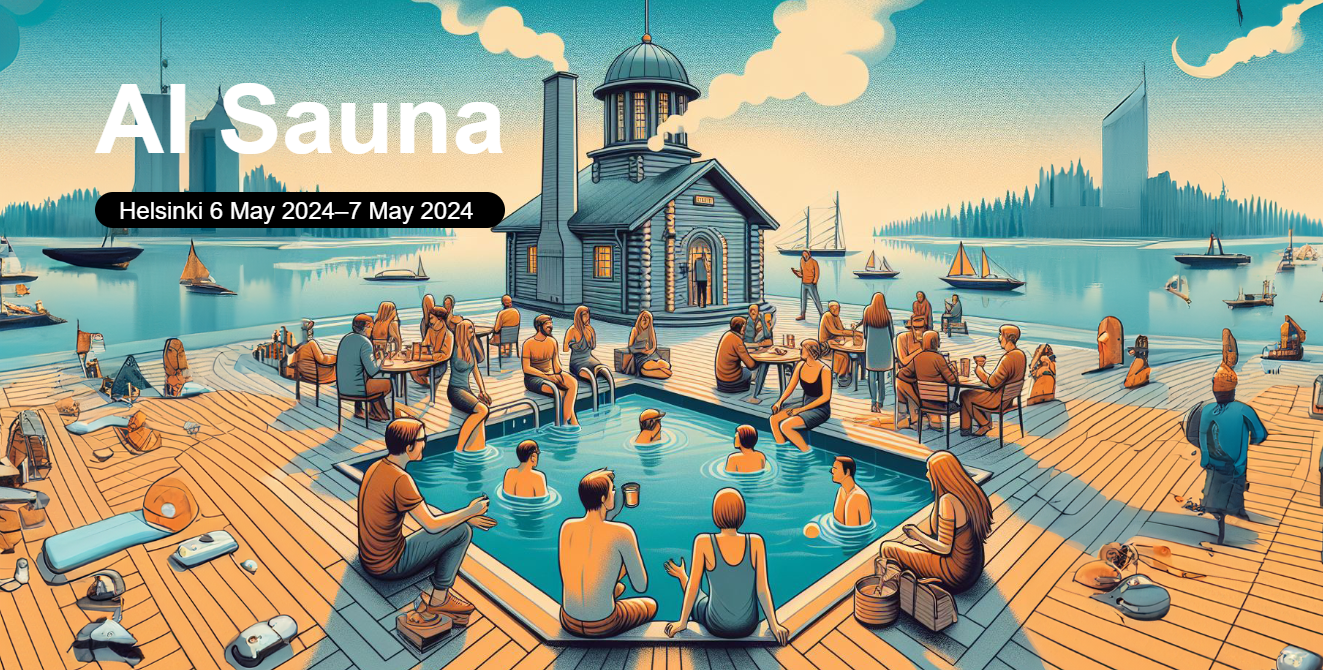
Official event website: https://meta.wikimedia.org/wiki/AI_Sauna
AvoinGLAM invites Open Culture advocates and creators of the open ecosystem to join the Finnish GLAMs (Galleries, Libraries, Archives and Museums), research projects and companies to envision the future of Open Culture in the age of AI. The event takes place in Helsinki 6–7 May right after the Wikimedia hackathon in Tallinn 3–5 May. The two-day event will hear inspire talks from participants, explore common themes and work on them in workshops on the second day.
National Library of Estonia
Tõnismägi 2, 10122 Tallinn
+372 630 7100
info@rara.ee
rara.ee/en

